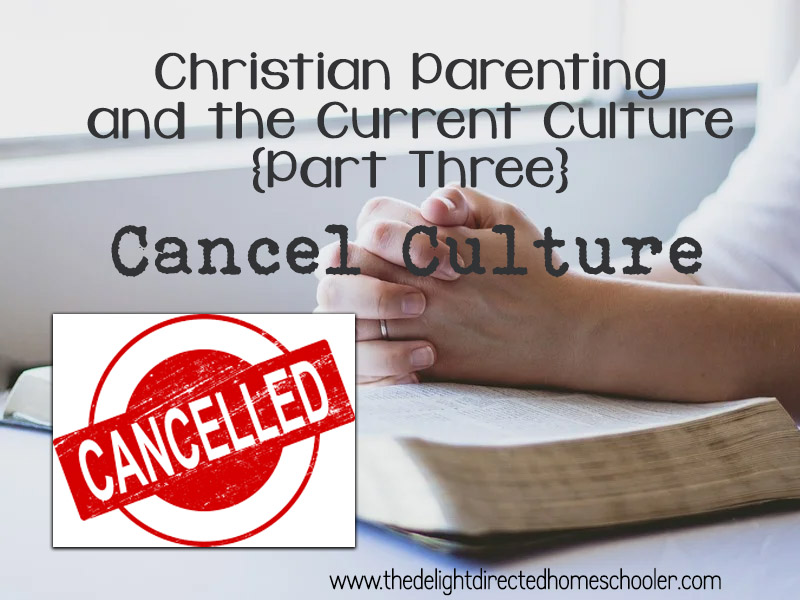I have some thoughts on cancel culture that I want to share, but first let’s define our terms. Defining your terms is super important when engaging in conversation. With the world we live in today, different words or phrases might mean something different to you than it does to the person with whom you are talking.
From Wikipedia: Cancel culture or call-out culture is a modern form of ostracism in which someone is thrust out of social or professional circles – whether it be online, on social media, or in person. Those subject to this ostracism are said to have been “cancelled”. The expression “cancel culture” has mostly negative connotations and is used in debates on free speech and censorship.
From Miriam Webster Dictionary: the practice or tendency of engaging in mass canceling as a way of expressing disapproval and exerting social pressure.
From the Cambridge Dictionary: a way of behaving in a society or group, especially on social media, in which it is common to completely reject and stop supporting someone because they have said or done something that offends you.
A few examples of those who have been “cancelled” in recent times include:
- Mike Lindell: The CEO of My Pillow came under fire when questioning the results of the 2020 election as well as his support of Donald Trump.
- J.K. Rowling: This Harry Potter author came under fire when voicing her opinion that the transgender agenda will ultimately endanger women’s rights. Many of her critics have called to boycott her books.
- Gina Carano: This actress from the Disney Plus Star Wars Series, The Mandalorian was fired after she posted on social media that being a Republican in 2021 was much like being Jewish during Nazi Germany.
- George Washington, Thomas Jefferson, and Abraham Lincoln: These United States Presidents have been wiped from San Francisco public schools because the school board decided they had “dishonorable legacies.”
In my opinion, cancel culture makes people, companies, movies, books, music, etc. one dimensional and strips them of their humanity. I am not saying that racism, hatred, prejudice, sexism, and the like aren’t real and should not be addressed. I absolutely think we need to stand up to evil and combat it with the gospel. I absolutely believe that God has created man in his image. We should be treating each other as image bearers and with the utmost respect. So please… understand when I am writing these posts about parenting and our culture and I address something that might or might not include some form of prejudice… it is not because I downplay or condone hatred. I just think that we are focusing on the wrong things. We are spinning our wheels and exhausting ourselves to put out fires that aren’t really there. And if we are putting out all these non- fires… when the big ones come, we will be too tired to fight.

Ok. So… let’s break it down in a practical way. How do we, as Christian parents, teach our children to love in this world of cancel culture? How can we navigate the challenge that comes forth when our children are getting the message it is ok to cancel someone who says something that offends us. How do we teach healthy boundaries and healthy conversation? How do we teach reconciliation and moving forward?
Let me tell you an observation I’ve had recently. And maybe this won’t sit well. I think Christians were engaging in cancel culture long before it became popular and woke. Here’s why. When my kids were little (and even still now that they are a little older), I always tried to act as a bit of a gatekeeper. I tried and still try to filter what comes into our home via books, movies, music, television, etc. I have four children and simply cannot read everything, listen to everything, orwatch everything. It is too much. I make use of conversations with other moms, online reviews from trusted sources, etc. I started noticing a trend in a lot of Christian reviews. Whenever a new Disney movie (just using this as one example) comes out, there are immediately those who, under the name of Christianity, blow the alert trumpets… this movie contains this ideology or this agenda. Or… watch out for this possible, maybe kiss in the background that definitely promotes same sex relationships. Or did you see those two men holding hands? Or …. Etc. A small thing in the movie that may or may not be there gets blown up and then the movie gets canceled in the Christian circles… and if you let your kids watch it, you might get labeled with a scarlet “D” (Disney mom… gasp).
Am I saying to let your children watch, read, and listen with reckless abandon… NOPE! Should you have standards… YEP! I am advocating critical thinking and open conversation. Guess what? You can gate keep all you want… but your kid is going to get exposed to something you don’t like at some point and you need to be willing to talk it out rather than just canceling the show, the friend, the group. And maybe, after the conversation, you come to the conclusion that said movie, book, etc. isn’t actually healthy and should not be something to allow into your mind.
Now… a caveat where I may seem like I’m doubling back. If your child is in a situation where they are continually exposed to something unhealthy that goes against your family values or is just downright evil and not ok… TAKE THEM OUT! Some things do require removal.
My whole point is that I think we, as Christians, are often quick to cancel and maybe need to take a step back and look at what it could mean to press in and have conversation. This could come into play in a situation where your child has bullied or is bullying. Or perhaps in place where an offense has taken place.
I’ll share an example that happened recently in a co op I’m familiar with. A teacher said something a little off putting and completely off topic to a student. The student was taken aback and had her feelings hurt (rightly so, in my opinion). She left class and was too upset to return. Now… she had a choice. She could hold onto the offense and quit the class completely or she could be bold enough to go back and have a conversation. She could be willing to own up if there was something she did wrong in the situation as well as express the hurt she felt. She could choose to move forward and love the teacher and treat her with kindness or she could just say, “Forget it” and, for all intents and purposes, cancel the teacher.
It would be easy to cancel the teacher and walk away, but is that loving? Is that doing what Jesus called us to do when he said to “love your neighbor as yourself”? Would it be treating the other person as a human, prone to error and in need of love? Or would it be treating her as one dimensional… with no hope of change? How do we extend grace in a culture saturated in the call to “cancel” when we feel offended?
The list of ways we can cause offense to our fellow man is growing daily. I honestly cannot keep up with it. We are being conditioned to take offense at all the things and it is making us a hostile nation. It is sad and exhausting.

But guess what. God is bigger. God has always been and always will be. He is not afraid of this current culture. He has made no mistakes in bringing your children into it. On my phone’s lock screen, I have the verse “perhaps this is the moment for which you have been created” Esther 4:14. As I am continually assaulted with the things my children are facing, I need to be grounded in the knowledge that God created them and brought them into this world at this time for a purpose.
So… let’s get down to the nitty gritty. How can we parent our children in this current “cancel” culture? How can we teach healthy boundaries and good conversation?
Here are a few questions you could ask when your child has been offended by a friend.
- Why do you think you are so offended right now?
- Was there any truth to what the other person said?
- Are you offended because what they said is true or untrue?
- Do you think your offense is Biblical? Meaning… was the thing that happened unChrist like? Or unGodly? Does it go against God’s word?
- Is this friendship valuable to you? Are you willing to talk to them and let them know how you feel?
- Can you forgive this offense?
- How can you love this person even though they have hurt your feelings/ don’t agree with you/ said something you don’t agree with?
- Is it possible to be friends with someone who doesn’t share your core beliefs?
- If this person does not show remorse for their actions, can you still care for them? What would that look like?
Here are a few questions you could ask if something on social media offends:
- Why do you think you are so offended right now?
- Would it be healthy to engage in a conversation on social media?
- Is this a friend or just something you saw on a post?
- If this is from a friend, would you be willing to talk to them privately and let them know how you were affected by what they said?
- Can you be willing to listen to their side?
- Have you taken this to the Lord in prayer?
- What would it be like to walk away and not engage?
Are you tracking with me? I’ve found that asking questions is a HUGE part of parenting! Get those kids thinking! Why are you so offended? What are you willing to do about it? Not to be too cliche.. But “What would Jesus do?” Take time to slow down in this culture that is so quick to crucify anyone who doesn’t tow the line or fall into place with the narrative. Is your offense rightly placed?
God gave us minds. He gives his followers the Holy Spirit. We are not without resources. Critical thinking is not a value in our current culture, but it is so needed. And it is needed to be coupled with compassion. We don’t argue and fight for the sake of arguing and fighting and being right. We seek justice. We love mercy. We walk humbly with our God. Let’s teach our children how to be willing to think through and press in and reconcile rather than cancel.

